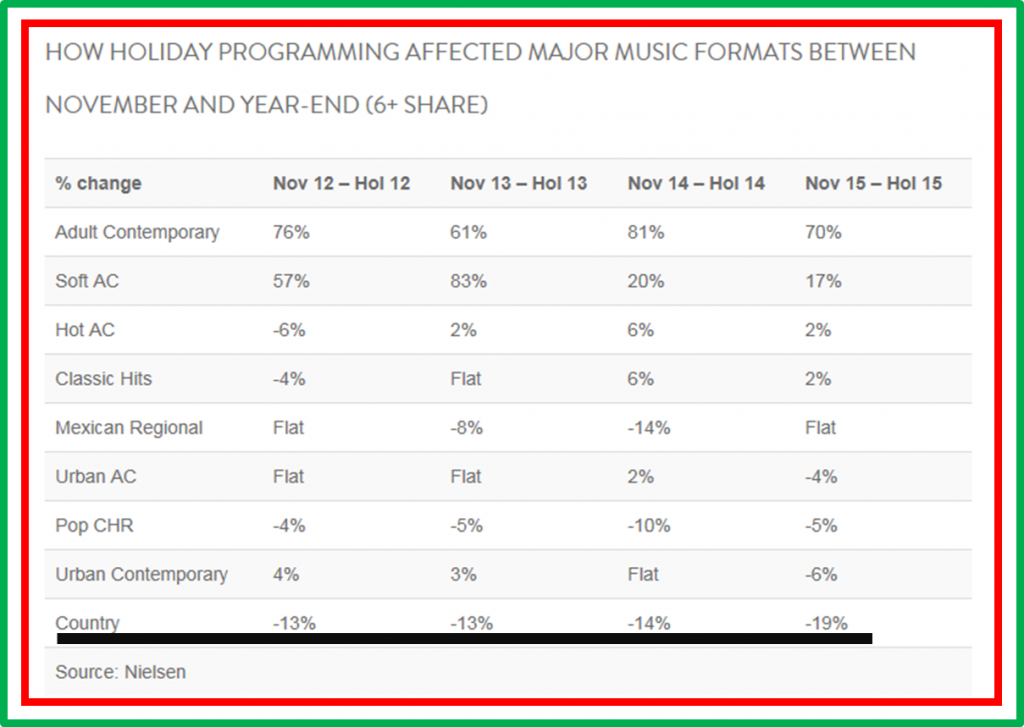For years now, the Weather Channel has been naming storms, so there’s no reason why we shouldn’t name rating books – especially those that wreak devastation across a major part of the radio industry.
Actually, that’s been happening for years. If you live in a cold weather market, there have always been “Blizzard Books.” And if you’re doing radio in Denver or Charlotte right now, you’ll probably refer to the last couple months as “The Football Book.”
Those anomalies, however, are unpredictable. We never know when a weird weather event will occur or when a team will get hot, put it all together, and get to the Big Game.
But there’s something that happens every year – like clockwork – and it destabilizes ratings in just about every market around the U.S. in the ratings period covering November, December, and the Holiday period. The new Nielsen post-mortem report is out about holiday music, and while the season ought to ring in an excessively lucrative end of the year, many of the other stations in town find coal in their ratings and revenue stockings.
“Santapocalypse.”
While most of us enjoyed a little down time over the holidays, there’s a group of radio professionals who weren’t exactly partying during “Santapocalypse.” In fact, I’d wager a guess they’ve had more than a few sleepless nights these past few weeks.
I’m talking about the owners and operators of Country radio stations across the U.S. who simply have to deal with the inevitability of lousy ratings to wrap up their otherwise good years. Then there are the Country consultants like Mike O’Malley and Joel Raab. Every Q4, they find themselves left with the task of calming their legions of clients. While everyone in the Country community believes the numbers will bounce back in January (or February), the collateral damage in both ratings and revenue is real.
While the industry trades gush over the record-setting numbers enjoyed by the more than 500 radio stations that change format every year in November to play Burl Ives and Brenda Lee songs, what about the toll “Santapocalypse” takes on the formats most negatively impacted by holiday music?
Oddly enough, it’s Country, and this year’s damage was worse than ever. Below is the Nielsen chart that isn’t typically plastered all over the trades. For the period when holiday music ran rampant, Country radio suffered an all-time worst hit of -19%.
Other formats suffer, too, but it’s Country – famous for its storytelling song lyrics and female-skewing audience – that’s especially vulnerable to the strains of holiday music. At this emotionally charged time of the year when thoughts of family, friends, and memories are top of mind, Country radio always takes a massive hit.
Conversely, AC stations on this same chart enjoyed a rise of 70% (and not all of them flipped to holiday music!), and a look at individual stations that change format each November reveals ratings that can triple from September and October levels. Oftentimes, the holiday music station is in the same cluster with sister stations in formats like Country, CHR, and others that are negatively impacted by this annual trend.
But there’s nothing wrong with this, and in fact, the all-holiday music movement is something we honored back in 2014 in our “Radio’s Most Innovative” series. In many ways, it’s a testament to the power of radio, and how it can capture the emotional moment in millions of people lives. But the issue here isn’t just the ratings success of these stations, but the larger question of monetization.
So perhaps the question when it comes to the all-holiday music phenomenon is this:
What does success look like?
I love to think of our work and our initiatives in this light, because as I’ve learned over the years, people define success very differently.
I would submit to you that the real measure of holiday music’s impact is often lost on industry analysts. That’s because while ratings records are nice, revenue results are the true yardstick of a win. It’s not about Nielsen; it’s about Miller Kaplan, because huge cume and TSL growth in November-December-Holiday means little if advertisers aren’t paying dearly for the privilege of having a marketing presence on these stations when they’re in the midst of the holiday spirit.
So that’s the question at hand – how successful are holiday music stations in converting their Christmas music windfall into end-of-year cash, knowing that year in and year out, they’ll lap the field in the ratings? How well are they able to create packages, raise rates, and seize the moment for both advertisers as well as filling their own coffers.
And for perspective, let’s look at what we can learn from the Super Bowl this coming Sunday. Because if that story was about ratings and viewership, we’d all be missing the point. For the Super Bowl, success looks like $5 million a spot. And to advertisers who have lined up to be a part of it, it’s well worth the money.
Just like it should be for the holiday music period of radio – “Santapocalypse.”
The numbers show that radio stations that throw out their formats to coincide with the holidays score big every year – exactly the narrative that should help sales reps command and get abnormally high rates. The Super Bowl is a proven winner for whatever network carries the game. And holiday music is a home run for stations that traditionally deck their halls with the sounds of the season.
So while many radio stations suffer during this period at the hands of the all-holiday music station across the street (or in the same building), the silver cloud in “Santapocalypse” ought to be the windfall of ad dollars – and not just ratings – these stations enjoy as a result. But somehow, we never read about the revenue numbers that ought to double or even triple as a result.
Throughout this week, we’ll be discussing important marketing and programming lessons, courtesy of the Super Bowl. And the most important one may be the host network’s ability to fully reap every last cent as a result of the Big Game – on the air and off.
Until the radio industry and its biggest players figure out a way to truly monetize “Santapocalypse,” it is hard to characterize this annual event as a success. And while it is evidence of radio’s emotionally charged impact on consumers, it means little if revenue isn’t commensurate with these amazing ratings.
Sorry to go Mr. Bah Humbug on you, but when it comes to all-holiday music, show me the “Santapocalypse” money.
- What To Do If Your Radio Station Goes Through A Midlife Crisis - April 25, 2025
- A 2020 Lesson?It Could All Be Gone In A Flash - April 24, 2025
- How AI Can Give Radio Personalities More…PERSONALITY - April 23, 2025







The good news is monthly measurement shows the spike. Better is having more sample to capture all channels. Best is radio innovating for new “perfect storms!”
Better yet is truly cashing in on the phenomenon. Thanks, Clark.
Fred-
Great read and this couldn’t be more spot on. As GM for a group of stations without a “Christmas present” 🙂 I can tell you we just basically ignore the holiday book, as does frankly almost all of the radio buying community. I would bet 80%-90% of more of the agency folks just “throw it out”. Also, my market was down double digits locally and has been the last three Decembers in a row…so, in a nutshell.
“Show me the money?”
Absolutely. As a programming guy, I’ve learned (the hard way) that the only true measure of success is if it makes money. I wonder if every broadcast CEO shouldn’t run their own test of the real value of this stunt. The solution, of course, isn’t to stop doing it, but to innovatively develop strategies to monetize it. Thanks for the affirmation, Dave.
In the early days of the Christmas format flip, some country stations tried it and lost, big. Is it time for country stations to try again, since we are seeing some oldies and / or classic hits stations make the flip and enjoy the boost.
There is a good library of country Christmas songs. So do you stick with your image country artists and their Christmas tunes or do you become the station that plays Dierks Bently 46 weeks of the year and then play Michael Buble and Mariah Cary for the holiday? Tough call.
I’ll leave your question to the experts in Country. Demographically, you could make the case. But again, my litmus test is financial success.
This is a fascinating case study. Its probably good that people still flock to radio for Christmas music when there are plenty of other places to get it – radio is doing something right here maintaining its position as the go to place, monetized or not.
I’m not sure that there is a big picture monetization here. Those 15 shares have to come from somewhere – so getting the rate for the Christmas music ratings is more a case of moving money around than creating incremental dollars. The only obvious way for a net gain to radio to occur is if Christmas music increased PURs – then there should be extra money there. Otherwise, shifting money from your COuntry station to your AC station doesn’t really change things – revenue for the cluster is the same at the end of the year. Someone said that in their market they just ignore the holiday book – that’s a lazy mistake for ad buyers because they’re not getting what they expect and pay for, But for radio, unless there is a way to increase the pie rather than redistribute it, what’s the difference?
Maybe this is just a case of Lyndon Johnson’s old adage – “better to have them inside the tent P***ing out than outside the tent p***ing in.”
Bob, thanks for taking the time to weigh in. Why can’t radio actually expand the pie for an event as ginormous as all-holiday music? Families get together during the most emotional time of the year to decorate the tree, go shopping, and celebrate a holiday that is both religious and commercial – and radio is the soundtrack. Tell me that a “Christmas Music Upfront” back in September couldn’t grow radio’s revenue, if not in 2016, then a few years down the road. For this event to destabilize radio for 90 days with limited revenue to show for it is simply a lost opportunity.
You might be right. Some research to support the positive ad environment being worth more to advertisers wouldn’t hurt and as you point out, this would be a multi year project. Inevitably, advertisers would push back and balk at paying a premium for what they’re used to getting at their normal rate. Radio would have to be willing to hold the line for a year or two and close out people not willing to pay the freight.
It’s a process, but ultimately, radio would be well-served by treating this programming as a premium product.
Fred
Very good subject and one that should be addressed now, not in November or December. Some stations do take advantage of the Christmas programming and generate increased revenue from it….but most don’t. And even then most don’t fully maximize it when you think of how much it impacts ratings. I remember in the early days of this programming strategy part of our sell to the stations to do it was that they want to become the Christmas station in the market and own the image so that year after year the audience knows it is coming and they come to the station for it. That happens. People start calling stations and talking about and wondering when the Christmas music is going to start. It works better than anything we have ever done. There is no other programming strategy in radio that wins so big and over so many weeks.
And it doesn’t just show up in the holiday book, it begins scoring in the December book.
But…back to your point….and my point….if stations own it and the advertising community knows the station is going to do it, they also know the ratings are going to increase and more people will be hearing their commercials. Radio stations should be able to sell this in advance, its almost a guarantee that ratings increase. Stations should raise rates and have special rates for Christmas programming just the way the networks do for the Super Bowl. And just like with the Super Bowl position it that there is only so much time and if you want to get in you better buy now.
Anything less is a lost opportunity.
The ratings shares and cume say Merry Christmas even though early on many in the business didn’t think it would be a successful strategy. There are some that still don’t believe it can be sold at a premium each year, but it can and should be. Revenue shares should be saying Merry Christmas too. Thanks for bringing up the subject Fred.
Dan, as someone on the ground floor of the holiday music phenomenon, your comments carry a great deal of weight. Your logic is, of course, impeccable. Going all in year after year builds the branding and the audience. But if stations simply don’t make the commitment to truly capitalize on their ratings windfall, everyone loses.
Not to mention potential clients that don’t reap the benefit of being on the air during this stunt. It’s like waiting for CBS-TV’s Super Bowl ratings to come out and then make the buy. Once the game – or holiday music – is over, it’s over. Thanks for the comment and for reading our blog.
Fred, your observations are spot on. As we’ve watched the “Christmas story” unfold – year after year – it has become increasingly frustrating that it fails to catapult revenue to another level. To your point, there is no reason to not expect market revenues to grow instead of simply shifting from one station to another. It truly is our Super Bowl. Every year. Part of the problem is our own resignation that buyers throw out the Holiday ratings because they’re attached to the “13th book” of the year. An even bigger part of the problem is that we let that happen. That’s on us. Our industry would benefit greatly from a more unified strategy to create the momentum and excitement about these ginormous ratings increases that could be effectively monetized (e.g. a Christmas music upfront). I’m thinking our friends at Nielsen could be very strong allies in helping us create that strategy. Absent their help we could – and should – do this on our own. Thanks for putting it out there. I’m game.
Dennis, thanks for the comment and the observations. Rather than writing off the Holiday book, it could be parlayed into an annual windfall, like the Super Bowl is to its host TV network. Your Nielsen comment is a good one. Rather than produce a “post mortem” on Santapocalypse, proof of concept for these all-holiday stations ought to produce a considerable influx of well-deserved revenue. Thanks!